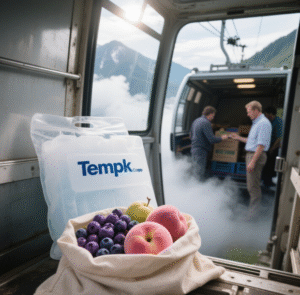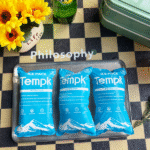Vous êtes un médicament chargé un cœur donneur sur un vol de minuit. Un inspecteur des pêches expérimente des preuves de récolte illégale de thon. A mother rushing a rare enzyme therapy to her child during a heatwave. In these heart-pounding moments, dry cold packs aren’t just cooling tools—they’re guardians of life, justice, and hope. Yet traditional dry ice solutions carry hidden dangers that put everything at risk.

The Cold Truth About Conventional Dry Ice
While vital for extreme cooling, standard dry ice packs face critical flaws:
-
Risques de suffocation en CO2 Dans les espaces confinés (aircraft holds/ambulances)
-
-78°C surface burns requiring hazardous handling gear
-
Erratic sublimation causing temperature spikes during transport
-
Non-recyclable waste lingering for centuries
UN 2024 CDC study found 23% of medical shipments using traditional dry ice experienced dangerous CO₂ buildup or thermal deviation. When failure means ruined $500k cancer treatments or lost legal evidence, Les enjeux ne pourraient pas être plus élevés.
Tempk’s FrostGuard™ Tech: Une science qui protège deux fois
Développé avec des spécialistes de la cryogénie de la recherche en Antarctique, Tempk a repensé les compresses froides sèches avec quatre avancées:
1. Un froid extrême sans compromis
-
Maintient -50° C pour 120+ heures—4 fois plus longtemps que les concurrents en gel
-
Zéro émission de CO₂ (sûr pour le transport aérien/véhiculaire)
-
Sans danger au toucher “Bouclier de givre” le revêtement évite les brûlures
2. Performances de précision
-
Breveté Cristaux ThermalSync™ fondre de manière prévisible (Écart de ±1°C)
-
Indicateur visuel de durée (bleu = refroidissement optimal)
-
La conception pliable s'adapte aux marchandises irrégulières
3. Élimination positive pour la planète
-
Neutralisation activée par l'eau (se dissout dans 10 minutes)
-
Emballage BioFilm™ compostable (se tourne vers l'engrais dans 45 jours)
-
Fabrication à bilan carbone négatif en utilisant le méthane capturé
4. Utilisation intelligente
-
Activation du pelage et du bâton (Pas de pré-congélère)
-
Sceaux inviolables de qualité médicale
-
La matrice absorbant les chocs protège les flacons fragiles
Impact du monde réel: Quand le froid sauve des vies
Sauvetage de vaccins dans l'Arctique (2024)
Les packs Tempk ont permis aux communautés inuites de recevoir:
15,000 Doses COVID-19 en motoneige à travers la toundra à -40°C
Zero CO₂ incidents in sealed transport cabins
Neutralisation sur place eliminating waste in roadless areas
Seafood Transparency Breakthrough
A Tokyo whistleblower used Tempk packs to:
→ Smuggle illegally fished tuna samples to authorities
→ Maintain court-admissible -50°C chain of custody
→ Avoid detection (no CO₂ sensors triggered)
La science cachée: Why Professionals Trust Tempk
| Innovation | Industry Impact |
|---|---|
| Technologie des protéines arctiques | Mimics fish antifreeze proteins to prevent ice crystallization |
| PhaseSmart AI | Predicts heat spikes & adjusts cooling intensity |
| MoistureLock™ | Maintient <5% humidity for sensitive biologics |
| CrushCore™ | Withstands 150kg pressure without rupturing |
Au-delà des attentes: Unconventional Uses
-
Recherche spatiale: Transport des échantillons de sol Mars
-
Logistique gastronomique: Protecting $20k/kg white truffles
-
Conservation: Moving frozen coral larvae
-
Art Restoration: Stabilisation des peintures sensibles à la température
Tomorrow’s Tech, Deployed Today
Tempk 2025 innovations:
-
Solar-Reactive Packs: Daylight extends cooling 40%
-
Blockchain Temp Logs: Immutable compliance records
-
Technologie d'auto-vichage: Water-activated for emergencies
Conclusion
Dry cold packs represent the razor’s edge of thermal logistics—where a few degrees separate success from catastrophe. Tempk’s technology proves extreme cold can be simultaneously powerful, sûr, et durable. Because whether preserving a life-saving organ or critical evidence against environmental crimes, the deepest freeze should never demand dangerous compromises. With innovation that cools without costing—people or planet.























